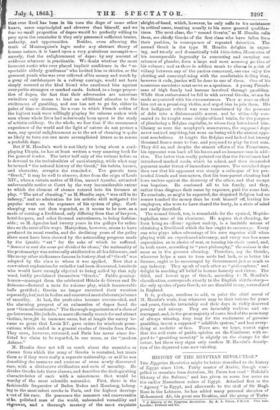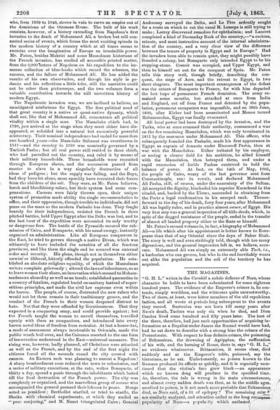HISTORY OF THE EGYPTIAN REVOLUTION.*
THE Egyptian Revolution might be better described as the history of Egypt since 1798. Fairly master of Arabic, though com- pelled to translate from dictation, Mr. Paton has read " Makrizi's History of the Sultans," and has given us some few notes on the earlier Mussulman rulers of Egypt. Attached first to the " Agency " in Egypt, and afterwards to the staff of Sir Hugh Rose in the Lebanon, be has added many personal sketches of Mohammed Ali, his great son Ibrahim, and the group of Turks.
A History of the Egyptian Resolution. By A. A. Paton, F.R.G.S. Two vols.. London : Trtibner and Co.
who, from 1839 to 1848, strove in vain to carve an empire out of the dominions of the Ottoman House. The bulk of his work consists, however, of a history extending from Napoleon's first invasion to the death of Mohammed Ali, a broken but still con- nected series of events, which forms the most exciting episode in the modern history of a country which at all times seems to exercise over the imagination of Europe an irresistible power. Mr. Paton, besides Makrizi and some Mussulman historians of the French invasion, has studied all accessible printed matter, from the 2,0001etters of Napoleon on his expedition to the im- mense collection of blue-books which record the schemes, the success, and the failure of Mohammed Ali. He has added the results of his own observation, and though his style is pe- dantic and his reflections a little trite, still the narrative could not be other than picturesque, and the two volumes form a valuable contribution towards the still unwritten history of modem Egypt.
The Napoleonic invasion was, we are inclined to believe, an unmitigated misfortune for Egypt. The first political need of that great country is a native or quasi-native dynasty, which shall not, like that of Mohammed Ali, concentrate all political vitality within a single man. The Mameluke chiefs had, in 1798, just arrived at the stage when they must either have dis- appeared, or subsided into a natural but excessively powerful aristocracy. Their nominal independence had ended for more than two hundred years—the llilameluke Sultanut was overthrown in 1517—and the country in 1708 was nominally governed by a Turkish Pasha; but all real power still resided in these chiefs, who had parcelled out the country, and ruled it by means of their military households. These households were recruited through European slaves, and the succession passed from master to slave in a way singularly destructive of all ideas of pedigree ; but the supply was failing, and the Bays, had they been let alone, must speedily have recruited their forces from the children of the soil. They were, as Mr. Paton believes, harsh and bloodthirsty rulers, but their system had some com- pensations. Careers were fairly thrown open, their unique system of promotion made ability the single recommendation to office, and their oppression, though terrible to individuals, did not press on the mass as the modem Pashalic has done. They fought bravely for their independence, resisted the French in three pitched battles, held Upper Egypt after the Delta was lost, and to the last hour of the expedition were accounted its only worthy or dangerous foes. The battle of the Pyramids secured the sub- mission of Cairo, and Bonaparte, with his usual energy, instantly organized an administration. Like all European conquerors in the East, he tried to govern through a native Divan, which was ultimately to have included the notables of all the fourteen provin2es, and like them the single end he secured was external order and security. His plans, though not in themselves either unwise; or illiberal, bitterly offended the population. He esta- blished an absolute religious equality, of which the Mussulman writers complain grievously ; altered the laws of inheritance, so as to leave women their share, an innovation which seemed to Moham- medansan absurdity as well as an insult; established quarantine in a country of fatalists, regulated burial on sanitary instead of super- stitions principles, and made the civil law supreme even within the harem. The people, of course, distrusted the new rulers who would not let them remain in their traditionary groove, and the conduct of the French to their women deepened distrust to hate. Not that they were offended by licentiousness. That they expected in a conquering army, and could provide against; but the French taught the women to unveil themselves, travelled openly with them as companions, and introduced into every harem novel ideas of freedom from restraint. At last a house-tax, a mode of assessment always intolerable to Orientals, made the public wrath boil over, and the Cairenes resorted to the one form of insurrection understood in the East—universal massacre. The rising was, however, badly planned, all Christians were attacked as well as the French, and by the end of the first night the citizens found all the mounds round the city crested with eannon. An Eastern mob was planning to unseat a Napoleon ! A sharp bombardment soon reduced the town to submission, and a series of military executions, at the rate, writes Bonaparte, of thirty a day, spread a panic through the inhabitants which lasted till the final destruction of the French power. The city was completely re-organized, and the marvellous group of savans who accompanied the general pursued their labours in peace. Menge acted as president ; Berthollet startled, or tried to startle, the Sheiks with chemical experiments, at which they smiled as " poor conjuring," and M. Nouet triangulated Cairo ; General Andreossy surveyed the Delta, and Le Pere ardently sought for a route on which to cut the canal M. Lesseps is still trying to make ; Larrey discovered remedies for ophthalmia; and Lancret completed a kind of Doomsday Book of the country,—" a curious, minute, and most instructive account of the internal administra- tion of the country, and a very clear view of the difference between the tenure of property in Egypt and in Europe." Had the invaders been able to remain quiet, they might possibly have founded a colony, but Bonaparte only intended Egypt to be his stepping-stone. Cosseir was occupied, and Upper Egypt, and then be himself set out for the conquest of Syria. Mr. Paton tells this story well, though briefly, describing the con- quest, the siege of Acre, and the retreat to Egypt, in two short chapters. The most important consequence of the defeat was the return of Bonaparte to France, for with him departed the last hope of permanent French dominion. The army re- mained some months, but attacked at once from India and England, cut off from France and detested by the popu- lation, permanent occupation was impossible, and on 30th June, 1800, after Kleber had been assassinated and .Menou turned Mohammedan, Egypt was finally evacuated.
All local power had been destroyed by the invasion, and the Turks, who at once resumed their authority, commenced a war on the few remaining Mamelukes, which was only terminated in 1811 by the massacre under Mohammed Mi. This officer, who subsequently founded the Pashalic, made his first appearance in Egypt as captain of Arnauts under Khousreff Pasha, then at war with the Mamelukes. Either irritated by his employer, or seeing a clearer field for his ambition, he allied himself with the Mamelukes, then betrayed them, and under a rapid succession of feeble Pashas contrived to hold the balance of power. At last, on the 14th of May, 1805, the people of Cairo, weary of the last governor sent from Constantinople, roes in revolt, and declared Mohammed AR Pasha, still, of course, under the suzerainty of the Sultan. Ali accepted the dignity, blockaded his superior Kurscheed in the citadel, and, backed by the Ulems, succeeded in obtaining from the Porte a legal confirmation in his usurped rank. Thence- forward to the day of his death, forty four years, after Mohammed Ali was legally ruler, and in practice almost owner, of Egypt. His very first step was a general inspection of all title-deeds, which, iii spite of the dogged resistance of the people, ended in the transfer of almost all landed property either to the State or himself.
Mr. Piston's second volume is, in fact, a biography of Mohammed Mi—a life which after his appointment is better known to Euro- peans than that of any Oriental since the days of Baber Shah. The story is well and even strikingly told, though with too many digressions, and the general impression left is, we believe, accu- rate. Mohammed Ali was simply an extremely able Turk, i.e., a barbarian who can govern, but who in the end inevitably wears out alike the population and the soil of the territory he has acquired.































 Previous page
Previous page